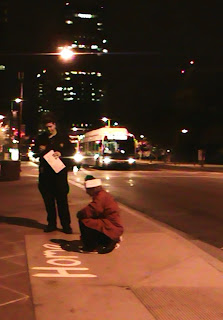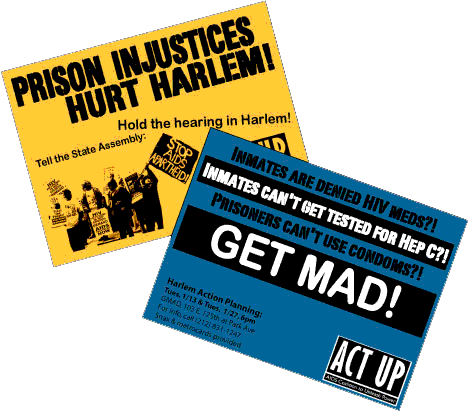 I'm taking Davon Acklin's family to prison today to see him for Christmas and may not be blogging much until tomorrow. Will thus leave you all with the wise words of another to contemplate and dream on: a marvelous holiday essay for all the prisoners and their loved ones out there, printed last year in the Huffington Post...
I'm taking Davon Acklin's family to prison today to see him for Christmas and may not be blogging much until tomorrow. Will thus leave you all with the wise words of another to contemplate and dream on: a marvelous holiday essay for all the prisoners and their loved ones out there, printed last year in the Huffington Post...Blessings to all. Be safe and well this day.
------------------------
What I Want For Christmas: Mass Clemency
Jacob M. Appel
Bioethicist and medical historian
Posted: December 23, 2009 09:41 PM
The United States Constitution and the laws of most states permit the President and governors to issue pardons and commutations, a prerogative frequently exercised during the winter holiday season. Unfortunately, with a few laudable exceptions, our chief executives have displayed considerable stinginess--and even outright political cowardice--in exercising this remarkable power.
President George W. Bush drew criticism from liberals for only pardoning 189 individuals and commuting 11 prison sentences during his eight years in office, but Bill Clinton cut short a merely marginally better 61 prison terms and pardoned only 396 convicts. Most of those pardoned each year have committed small-stakes crimes in the distant past such as selling bootleg whiskey or passing bad checks. Others, like Dan Rostenkowski and George Steinbrenner, are politically well-connected. It often seems that the principal purpose of these rare reprieves, much like the pardoning of a Thanksgiving Day turkey, is to make the pardoning politicians appear generous and affable to the electorate.
Yet with the United States now boasting the highest incarceration rate in the world -- more than 1 in every 100 Americans in currently behind bars -- our nation is long overdue for a mass clemency of non-violent felons and those unlikely to re-offend. Such a collective pardon and commutation would reunite hundreds of thousands of families, save billions of dollars in incarceration costs, and might foster a national spirit of forgiveness and reconciliation.
Few American politicians have dared to issue mass clemencies in the past. Andrew Johnson's grant of amnesty to former Confederate soldiers and Jimmy Carter's pardon of Vietnam-era draft evaders are likely the two largest acts of blanket forgiveness -- and both helped to heal our national wounds after periods of great division. Former New Mexico Governor Toney Anaya and ex-Illinois Governor George Ryan both deserve credit for commuting all of their state's death sentences to life terms. However, our current political leaders -- in both parties -- far more often appear afraid to ask for broad or bold clemencies.
John McCain's drive to secure a pardon for African-American boxer Jack Johnson -- convicted in 1913 of violating the Mann Act for his relationship with a white woman -- embodies this problem. Don't misunderstand me: I am all for pardoning Johnson, and Ethel Rosenberg, and Sacco & Vanzetti, and righting as many of the moral miscarriages of history as possible. However, I would much rather free the thousands of non-violent offenders serving long sentences under the draconian Rockefeller drug laws in New York State. So here's my Christmas wish: Each chief executive should order a special panel to determine, as quickly as possible, which prisoners either have a history of extreme violence or pose a high risk of re-offending. Those meeting neither criteria should be transitioned home as quickly as possible.
The advantage of a mass clemency is that it can be framed in terms of social policy and a spirit of charity, rather than the merits of any specific incident. That is not to say that there are not thousands of individual cases worthy of attention. In Michigan, for example, Shontelle Cavanaugh has now gone nearly five years without a trial for smothering her infant during a psychotic break -- a calamity compounded when the local prosecutor withheld video footage of Cavanaugh at the height of her psychosis. Governor Granholm could order this unfortunate woman's release. And there is the tragic case of Michelle Collette in Massachusetts, whose own trial judge blasted the severity of her seven-year sentence for possession of 14 to 28 grams of illicit oxycodone -- an injustice that could be rectified by Governor Patrick. But by focusing on these individual cases, as compelling and heart-wrenching as they may be, one risks losing sight of the greater cruelty of denying human beings liberty long after they pose any meaningful threat to society.
An individual pardon focuses on the nature of the crime. A mass pardon allows us to transcend questions of right and wrong. Unlike an individual grant of clemency, which often suggests that a miscarriage of justice has occurred, a mass clemency avoids the controversial issue of whether justice has been served and focuses on the question of whether it furthers any ethical purpose to perpetuate the punishment. One could simultaneously pardon Scooter Libby and all of the undocumented immigrants detained on identity-fraud charges while still avoiding the political hot potato of endorsing their specific conduct.
While an individual pardon may appear to be a slight to crime victims, who also merit our recognition and empathy, a collective pardon does not mitigate the respect that we should accord these victims' suffering. Moreover, a one-time mass clemency does not undermine the deterrent effect of stiff criminal penalties, because no potential offender is ever going to break the law in the hope that a second, future mass clemency will free him if he is arrested.
One of the glaring -- yet too often overlooked -- failings of contemporary America is that we have become a nation obsessed with justice and retribution. We claim to be The Land of the Free, yet we have lost sight of what it means to be imprisoned: denied liberty and access to one's family, subjected to isolation and violence and unspeakable boredom. We have come to believe, in the most pernicious way, that people should get what they deserve. What a sea change it might be in our public discourse and our civic life if we focused instead upon mercy and forgiveness. A merciful and forgiving culture might find itself with less anger, less social disruption, and even less crime. If we liberated only half of our prisoners, we could spend the billions of dollars saved educating children, or providing substance-abuse treatment to addicts, or training mental health workers -- breaking the cycle of neglect that sets future prisoners on their initial trajectory toward misconduct.
I am not naive enough to believe that all of our prisoners should be freed. Some individuals are truly unfit for reintegration into society. No reasonable person would argue that Charles Manson or Scott Roeder or admitted Al Qaeda terrorists should be sent home for the holidays. Fortunately, the majority of our more than two million prisoners are not fanatics and sociopaths. Many are good people who have exercised poor judgment. They have the same hopes and dreams as ordinary, free Americans, but they now squander their lives behind bars because our prison-industrial complex has gone haywire. They are, in short, the meek and wretched who the Biblical Jesus -- whether literal or figurative -- would want us to remember in our holiday prayers.
Will the White House read this column and decide upon a mass clemency? Unlikely. Such a bold step might make President Obama truly worthy of his Nobel Prize, and win him the praise of history, but political leaders of all stripes think in terms of poll numbers. I suspect that a mass clemency could be sold to the American public -- particularly as more and more Americans find their own loved ones imprisoned -- but I understand that to attempt such a courageous step requires a leap of considerable faith. I am more optimistic that, if enough people clamor for a mass clemency, one inspired state governor -- possibly a lame-duck chief executive without a political future -- will consider such a dramatic and compassionate act. If that happens, and the social order does not crumble, other political leaders may have the courage to follow. In the interim, I can only hope that the government lawyers assembling last-minute pardons lists, possibly as I write this, remember that each name they add to their clemency register is another flesh-and-blood human being who will be able to spent the Christmas holiday with his or her family.
 from the Syracuse Cultural Workers
from the Syracuse Cultural Workers



































































